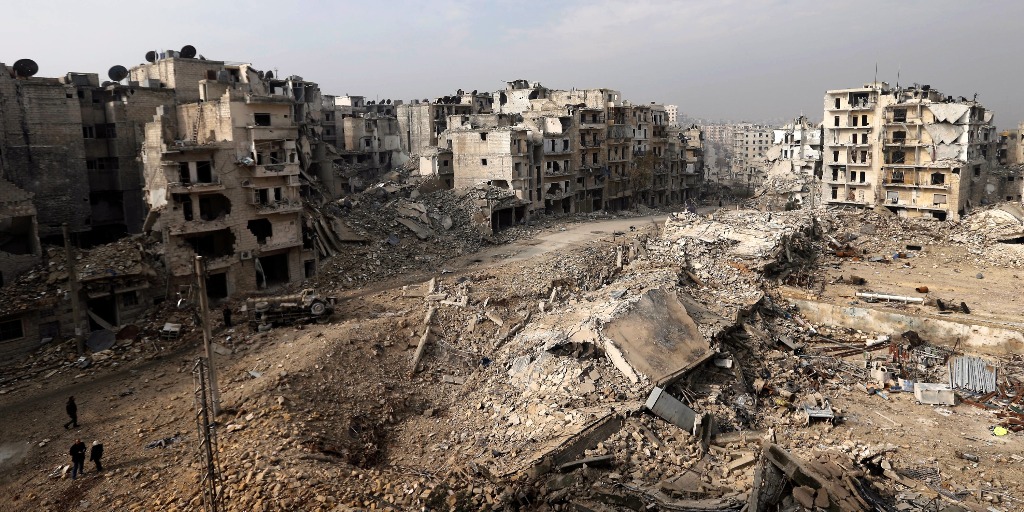KIMBERLY DOZIER
Sometimes reporters get called to a briefing so an administration can defend what it has done. And sometimes, it’s a warning of what it may be about to do.
On Thursday, two senior administration officials warned that the Trump administration could take military action – again – against the Syrian regime of Bashar al-Assad because of its continued use of chemical weapons against its own people.
The two officials, speaking anonymously as a condition of the briefing, further warned that if Syria’s behavior is allowed to continue, it could serve as a green light to other bad actors that could spell a chemical attack on U.S. shores.
And they’re holding Moscow responsible.
The two officials said Russia knows exactly what its client state Syria is doing, despite public protestations to the contrary, which are meant to sow doubt in the public with a wink at Washington.
“They’re not trying to fool us. They know what we know,” one of the officials said. “They’re trying to fool you.”
Frustration was apparent from the two national security professionals who’ve worked variations of this problem long before President Donald Trump took office. Thursday’s briefing signals that their boss in the Oval Office is losing patience with Damascus and Moscow, and could augur another volley of missiles aimed at Syria’s chemical weapons depots – similar to the strike last August as Trump supped with Chinese president Xi Jinping at Mar-a-Lago.
The officials said that recent attacks carried out by the regime have demonstrated “classic” symptoms of sarin use, such as pinpoint pupils in the victims, indicating that it’s “highly likely” that Syria has kept a stockpile of weapons – attacks that “suggest” that Syria is continuing to produce chemical weapons, despite a 2013 deal brokered in large part by Russia to declare its weapons and destroy its program. They gave offered no details of specific attacks, referring only to media reports.
The officials pointed out that Russia was behind the 2017 dismantling of the “Joint Investigative Mechanism (JIM)” of the UN Organization for the Prohibition of Chemical Weapons Joint – the body responsible for declaring that the Assad regime has used chemical weapons four times since it agreed to disarm in 2013, including last year’s sarin attack in Khan Shaykhun on April 4, 2017, which killed over 100 people. Russia voted against renewing the “JIM’s” 2015 UN Security Council mandate after the release of that fourth report on the sarin attacks on Khan Shaykhun.
Since last April, Syria has continued to use chemical weapons, the officials said. On Thursday, the AP reported that rescue workers in the rebel-held Damascus suburb of Douma described a suspected chlorine gas attack that injured a number of civilians.
Assad’s government denies such claims, and Russia also says the reports are false, a denial reiterated by the Russian embassy in Washington Thursday.
But the two U.S. officials say the attacks have evolved and grown more sophisticated from the days when Syria “gassed” its people by dropping barrel bombs of chlorine on them, with Assad’s troops coming up with new ways to deliver the deadly payloads.
The officials said the Syrian regime is now using “ground-launched” chlorine munitions and often aims them where the fighting is most intense, most likely to disguise their use. As one of the officials put it, they are using them in conflict areas that are hard to get to, and “that’s probably not an accident.”
Chlorine is not substance banned by international chemical weapons prohibitions, but when used as a weapon of war, it’s just as illegal as nerve agent sarin, they explained.
Does the Trump administration know where the chemical weapons plants and storage sites are? The officials wouldn’t answer that directly.
“It’s an issue we continue to track incredibly closely to help in a variety of ways,” one said.
The officials spelled a couple paths out of this nightmare: the international community could rally to convince the Syrian regime that there’s no way back to normalcy (read: billions in funding for rebuilding) if it keeps using the weapons; or Russia could convince its client state to stick to obliterating its enemies with conventional weapons of war.
“Our hope is they will understand they need to put a stop to this use…and they can do it quietly,” one of the officials said. “That’s fine. The use needs to stop.”
If not? “Our policy is zero tolerance of chemical weapons,” the other official said. “We reserve the right to use military force to prevent or deter the use of weapons of mass destruction.”
Why does it matter, when the horrific meat grinder of Syrian civil war has already taken hundreds of thousands of lives? Because if it’s allowed to happen there, it could catch on.
As one of the officials put it: “If it becomes a legitimate tool of terror or warfare, it will come here.”

No comments:
Post a Comment